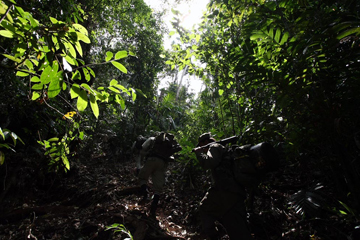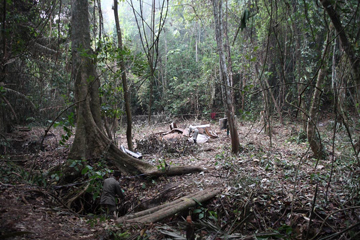Authorities, working with conservationists, have raided and closed several ‘ecstasy oil’ distilleries in Cambodia’s Cardamom Mountains. The distilleries posed a threat to the region’s rich biological diversity, reports Fauna & Flora International (FFI), the conservation group involved in the operation.
“The factories had been set up to distill ‘sassafras oil’; produced by boiling the roots and the trunk of the exceptionally rare Mreah Prew Phnom trees and exported to neighbouring countries,” said FFI. “The oil is used in the production of cosmetics, but can also be used as a precursor chemical in the altogether more sinister process of producing MDMA – more commonly known as ecstasy. The distillation process not only threatens Mreah Prew Phnom trees, but damages the surrounding forest ecosystem. Producing sassafras oil is illegal in Cambodia.”
The raids followed a month-long investigation by FFI and the Ministry of Environment which turned up several newly built sassafras factories run by Vietnamese syndicates in Phnom Samkos Wildlife Sanctuary. The sassafras oil is usually smuggled to Thailand or Vietnam.
  Rangers on patrol and the site of the raid. Photos by Luke Duggleby. More images available at LukeDuggleby.com. According to FFI, Sassafras oil processing plants are typically located beside streams to provide water for boiling. These streams become highly polluted by factory waste. Mreah Prew Phnom trees are cut down and the roots are then mechanically shredded and boiled in a cauldron over a wood-fire oven. Many more trees in the area are felled to provide fuel for the fire. The distillation process takes about 12 hours to make 30 liters of sassafras oil. Oil is carried out by hand, often over many kilometers of jungle terrain, to roads from which it is smuggled out of Cambodia to Thailand or Vietnam. The workers are paid around US$25 per month plus cigarettes. |
“The re-emergence of the sassafras factories in Phnom Samkos Wildlife Sanctuary is of enormous concern to us,” Tim Wood, FFI Field Coordinator at Phnom Samkos Wildlife Sanctuary, said. “Not only are we faced with the prospect that the oil may be used for producing illicit drugs, but the factories have a very destructive impact on the fragile habitats and ecosystems in the sanctuary.
“These factories are located close to streams and by-products from the distillation process causes significant pollution of the environment. In addition, the distillation process itself uses enormous quantities of fuel wood from other rainforest trees. Finally, the factory workers typically engage in poaching wildlife from the surrounding forests to supplement their basic diets. Thankfully, on this occasion we were able to locate and destroy the factories before they were in full production mode.”
FFI says the number of Mreah Prew Phnom processing plants in the western Cardamom Mountains has fallen significantly from more than 75 in 2006 since it launched its monitoring effort.
“Recent law enforcement operations clearly show that this threat still persists and that we must remain ever vigilant in our effort to suppress this and other forest crimes.” Wood said. “The rangers deserve our highest praise for their efforts in combating forest crime. They are at the front line of conservation and without their dedication and efforts the Mreah Prew Phnom trees would certainly have become locally extinct.”
View Larger Map
Related articles
Illegal drug use destroys rainforests November 18, 2008
Colombian officials have re-iterated their claim that cocaine use in rich countries is driving deforestation in Colombia, reports The Guardian. Speaking to a conference of police officers in Belfast, Northern Ireland, Colombian Vice President Francisco Santos Calderon said that 133,000 hectares of rainforest are cleared each year for coca cultivation. Coca is the raw ingredient for cocaine production.
Aquarium fish trade linked to cocaine, timber smuggling in Brazil August 10, 2008 Smugglers are using the ornamental fish trade to traffic cocaine and illegally logged timber according to a report from Sérgio Abranches of O Eco, a leading Brazilian environmental web site.